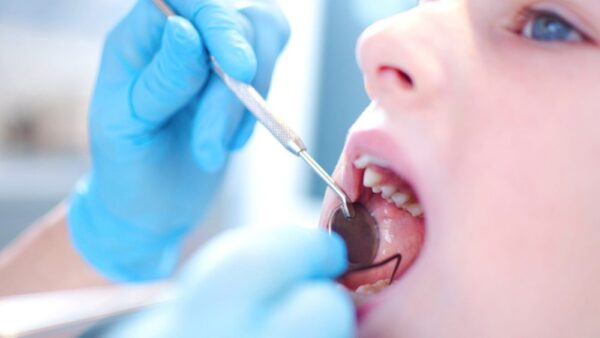While dental implants are a widely successful and popular solution for replacing missing teeth, they may not be suitable for everyone. Certain factors and medical conditions can impact a person’s candidacy for dental implant surgery.
It is crucial to consult with a qualified dentist or oral surgeon to assess individual oral health and determine the most appropriate tooth replacement options for each person’s unique circumstances. This article will answer everyone who should not get dental implants, don’t miss it!
Children and Teens
Dental implants are generally not recommended for children and teenagers, especially those whose jawbones are still developing. The jawbone of children and adolescents undergoes significant growth and maturation, and placing dental implants during this period can interfere with natural jaw growth and result in unpredictable outcomes.
Additionally, children and teenagers may not have fully developed oral hygiene habits, which are crucial for the long-term success of dental implants. Maintaining proper oral hygiene is essential to prevent complications such as gum disease, which can compromise the stability of dental implants.
Instead of dental implants, children and teenagers who are missing teeth are often provided with temporary tooth replacement options, such as removable partial dentures, until their jawbones have fully matured. Once their jawbones have reached full maturity, dental implant placement can be considered as a permanent tooth replacement option. The timing of dental implant placement for young patients should be carefully evaluated by a qualified dentist or oral surgeon to ensure optimal results and long-term success.

Smokers and Chewers
Continuing with the topic about who should not get dental implants, we highly recommend smokers and chewers. Smokers and chewers are generally discouraged from getting dental implants due to several reasons. Smoking and tobacco use can impair the body’s natural healing process, leading to delayed healing after implant surgery. These habits also increase the risk of infections, which can negatively impact the success of dental implants.
Additionally, smoking and tobacco use are associated with reduced bone density and bone loss, weakening the implant’s foundation and compromising its stability. Individuals who smoke or chew gum have an increased risk of developing peri-implantitis, a severe form of gum disease that affects the tissues surrounding dental implants. Studies have shown that smokers and tobacco users have a higher risk of dental implant failure compared to non-smokers.
To improve the chances of successful implant placement and long-term implant success, dentists often recommend quitting smoking or tobacco use before considering dental implant surgery. It is essential to discuss individual health factors and lifestyle choices with a qualified dentist or oral surgeon to determine the best tooth replacement options for each person’s unique circumstances.

People Who Don’t Take Care of their Teeth
People who don’t take care of their teeth should approach dental implants with caution for several reasons. Dental implant surgery requires a healthy oral environment for successful integration and long-term stability. Poor oral hygiene habits can lead to gum disease, tooth decay, and other oral health issues that may jeopardize the success of the implants.
Neglecting oral hygiene increases the risk of infections around the dental implants, hindering the healing process and potentially causing implant failure. Additionally, inadequate oral care can contribute to bone loss in the jaw, compromising the implant’s foundation. Healthy gums are essential for the stability and support of dental implants, and individuals with poor oral care may have gum issues that could affect the implant’s longevity.
Dental implants require regular maintenance and proper oral hygiene practices, so individuals who do not take care of their teeth may find it challenging to maintain the necessary hygiene routine for the implants. It is crucial for those with suboptimal oral hygiene to address their oral health concerns before considering dental implant surgery to achieve the best possible outcome and ensure the long-term success of the implants.

The Very Elderly (with some exceptions)
The decision of whether very elderly individuals should get dental implants depends on their overall health and individual circumstances. While age alone is not a strict factor that disqualifies someone from getting dental implants, there are certain considerations for the elderly:
- General Health: The overall health of the elderly individual is essential in determining their candidacy for dental implants. If they have uncontrolled medical conditions or compromised immune systems, it may impact their ability to heal after surgery and increase the risk of complications.
- Bone Density: Adequate jawbone density is necessary to support dental implants. Some elderly individuals may have experienced significant bone loss over the years, which can affect the success of implant placement. Bone grafting procedures may be required to enhance bone density.
- Ability to Undergo Surgery: Dental implant surgery is a minor surgical procedure that requires anesthesia. The elderly person should be physically able to tolerate the procedure.
- Commitment to Oral Hygiene: Proper oral hygiene is crucial for the long-term success of dental implants. The elderly individual should be capable and willing to maintain good oral hygiene practices.
- Existing Dental Health: The condition of the remaining teeth and the overall state of oral health are important factors to consider before proceeding with dental implants.
In many cases, dental implants can significantly improve the quality of life for the elderly by enhancing their ability to chew, speak, and maintain a healthy smile. However, it is vital for the elderly person to consult with their dentist or oral surgeon to assess their specific oral health needs and overall health status before making a decision. The dentist will conduct a comprehensive evaluation and discuss the potential benefits and risks of dental implants in their particular situation.
If you need any help, please call our helpline at 028 3920 9969 or 096 779 7799. In case you reside in Vietnam, Platinum Dental will be helpful to assist you in selecting the best smile therapy. Can’t wait to work with you!
PLATINUM DENTAL GROUP
- Location: 127 Nguyen Cu Trinh Street, District 1, Ho Chi Minh City
- Time: 8:00 – 20:00 (Monday – Saturday)
- Number: 028 3920 9969 – 096 779 7799



